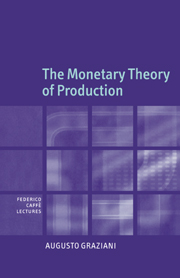Book contents
2 - Neoclassical monetary theory
Published online by Cambridge University Press: 03 July 2009
Summary
Introduction
One of the main theoretical conclusions of the neoclassical theory of money is that, in a totally frictionless and perfectly competitive market, money performs a wholly neutral role. While allowing exchanges to take place in a more efficient and rational way, and while avoiding the inconveniences of a barter economy, it alters in no way the final equilibrium position (Tobin 1992: 775). As we know, this would only be true if all prices without exception could move at exactly the same speed and in the same proportion – something which would leave relative prices unchanged. Experience shows instead that the reaction of money prices is different in speed and measure, which means that, at least for a while, any inflationary movement brings about an alteration in relative prices. As a consequence, market prices will no longer be equilibrium prices and distortions in the allocation of resources will appear.
The monetary theory of the neoclassical school tries in fact to show that, if we compare a barter economy and a monetary economy (available resources and individual preferences being the same), quantities produced and relative prices are the same. If this is true, money as a result becomes perfectly neutral, a mere veil, as already mentioned, hiding but not changing the substance of the equilibrium position (§ 1.2). The veil consists in the fact that in a monetary economy prices are no longer quoted in terms of a commodity chosen as numéraire but in terms of money.
- Type
- Chapter
- Information
- The Monetary Theory of Production , pp. 33 - 57Publisher: Cambridge University PressPrint publication year: 2003
- 1
- Cited by



